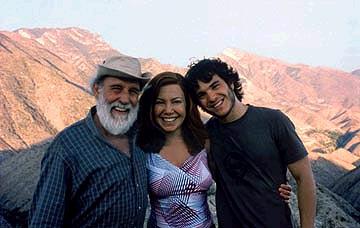Lucia, Lucia
(La Hija Del Canibal)


A revolution of sorts is going on in Mexican cinema. Movies there are pushing creative boundaries, expanding into new, uncharted waters. Amores Perros and Y Tu Mama Tambien are the best examples, while El Crimen de Padre Amaro and Herod's Law are overhyped but still part of this movement. Now, with critics and moviegoers salivating at the thought of interesting Mexican films, every film wants to jump on the bandwagon and proclaim themselves next in line. When a film calls itself great, it's never a good thing. The first film to do this was the (thankfully) little seen Todo el Poder, and now Lucia, Lucia steps up to the plate. Based on the novel La Hija Del Canibal by Rosa Montera, Lucia, Lucia tells of an awakening of middle-aged woman spurred on by the kidnapping of her husband. Overall, Lucia, Lucia is a decent film. It seems to peter out of a story and keeps running on empty, wearing out its welcome.
Lucia (Cecilia Roth, All About My Mother, Talk to Her) is a bored writer of children's stories. Or is she? Lucia narrates the story, and at the beginning admits that she is lying a lot. She wants to spice up her life by changing her hair color, making her apartment look better, or fudging the details of events. A Marxist group kidnaps her husband and asks for a large ransom. To her surprise, her husband reveals that he has the money stashed away in a safety deposit box. Felix (Carlos Alvarez-Novoa, Son of the Bride, Trofeo) helps her through this, and the two quickly become friends. They then befriend Adrian (Kuno Becker), a handsome young musician.
The two men move into Lucia's apartment, and the three become inseparable. Lucia slowly begins to realize that she is bored with her old life. Now she is living on the edge, carrying around a large amount of money and trying to go around the police to get to her husband. Felix has old contacts that may help them, and Adrian's beauty means that Lucia and he will inevitably fall for each other. This is about all that Lucia, Lucia has to offer. Because of hints in the beginning, the ending is extremely obvious. Instead of putting the focus squarely on Lucia's newfound sense of freedom, director/adapter Antonio Serrano (Sex, Shame and Tears) takes the plot down on an increasingly fantastic road.
It's kind of unfortunate for Roth, whose performance is good. It also illustrates that yes, there are good roles for women over the age of twenty-five, although not necessarily in mainstream Hollywood. Lucia, Lucia is just too thin on meaningful plot to sustain itself. The novel's name translates roughly to The Cannibal's Daughter, and this does figure into the plot, but it doesn't really tie into anything at all, and feels tacked on. So what's the moral? Well, after watching Lucia, Lucia and Sex and Lucia, the moral is, if one wants an interesting experience, just mix together a writer and a woman named Lucia who speaks Spanish.